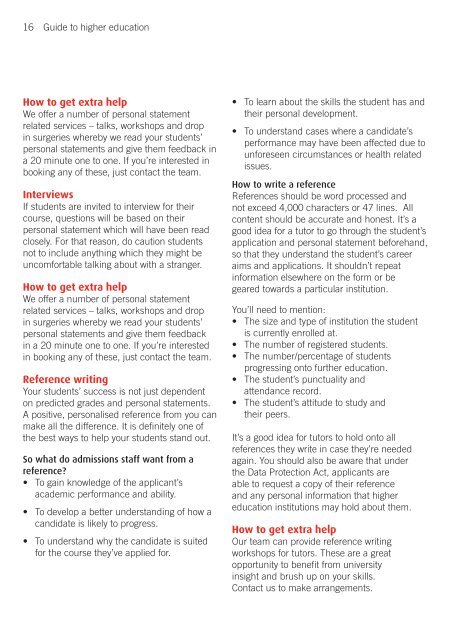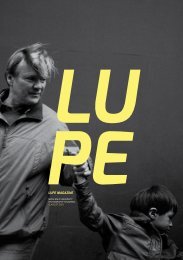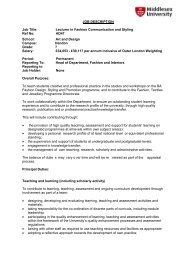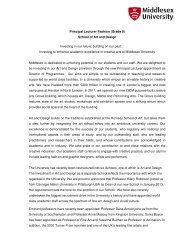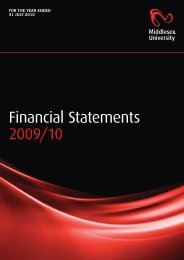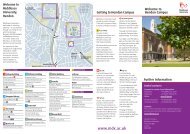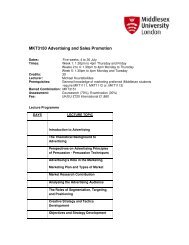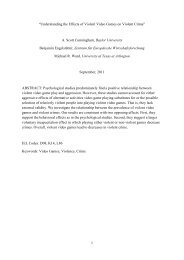Contact us: - Middlesex University
Contact us: - Middlesex University
Contact us: - Middlesex University
Create successful ePaper yourself
Turn your PDF publications into a flip-book with our unique Google optimized e-Paper software.
16 Guide to higher education<br />
How to get extra help<br />
We offer a number of personal statement<br />
related services – talks, workshops and drop<br />
in surgeries whereby we read your students’<br />
personal statements and give them feedback in<br />
a 20 minute one to one. If you’re interested in<br />
booking any of these, j<strong>us</strong>t contact the team.<br />
Interviews<br />
If students are invited to interview for their<br />
course, questions will be based on their<br />
personal statement which will have been read<br />
closely. For that reason, do caution students<br />
not to include anything which they might be<br />
uncomfortable talking about with a stranger.<br />
How to get extra help<br />
We offer a number of personal statement<br />
related services – talks, workshops and drop<br />
in surgeries whereby we read your students’<br />
personal statements and give them feedback<br />
in a 20 minute one to one. If you’re interested<br />
in booking any of these, j<strong>us</strong>t contact the team.<br />
Reference writing<br />
Your students’ success is not j<strong>us</strong>t dependent<br />
on predicted grades and personal statements.<br />
A positive, personalised reference from you can<br />
make all the difference. It is definitely one of<br />
the best ways to help your students stand out.<br />
So what do admissions staff want from a<br />
reference?<br />
• To gain knowledge of the applicant’s<br />
academic performance and ability.<br />
• To develop a better understanding of how a<br />
candidate is likely to progress.<br />
• To understand why the candidate is suited<br />
for the course they’ve applied for.<br />
• To learn about the skills the student has and<br />
their personal development.<br />
• To understand cases where a candidate’s<br />
performance may have been affected due to<br />
unforeseen circumstances or health related<br />
issues.<br />
How to write a reference<br />
References should be word processed and<br />
not exceed 4,000 characters or 47 lines. All<br />
content should be accurate and honest. It’s a<br />
good idea for a tutor to go through the student’s<br />
application and personal statement beforehand,<br />
so that they understand the student’s career<br />
aims and applications. It shouldn’t repeat<br />
information elsewhere on the form or be<br />
geared towards a particular institution.<br />
You’ll need to mention:<br />
• The size and type of institution the student<br />
is currently enrolled at.<br />
• The number of registered students.<br />
• The number/percentage of students<br />
progressing onto further education.<br />
• The student’s punctuality and<br />
attendance record.<br />
• The student’s attitude to study and<br />
their peers.<br />
It’s a good idea for tutors to hold onto all<br />
references they write in case they’re needed<br />
again. You should also be aware that under<br />
the Data Protection Act, applicants are<br />
able to request a copy of their reference<br />
and any personal information that higher<br />
education institutions may hold about them.<br />
How to get extra help<br />
Our team can provide reference writing<br />
workshops for tutors. These are a great<br />
opportunity to benefit from university<br />
insight and br<strong>us</strong>h up on your skills.<br />
<strong>Contact</strong> <strong>us</strong> to make arrangements.


